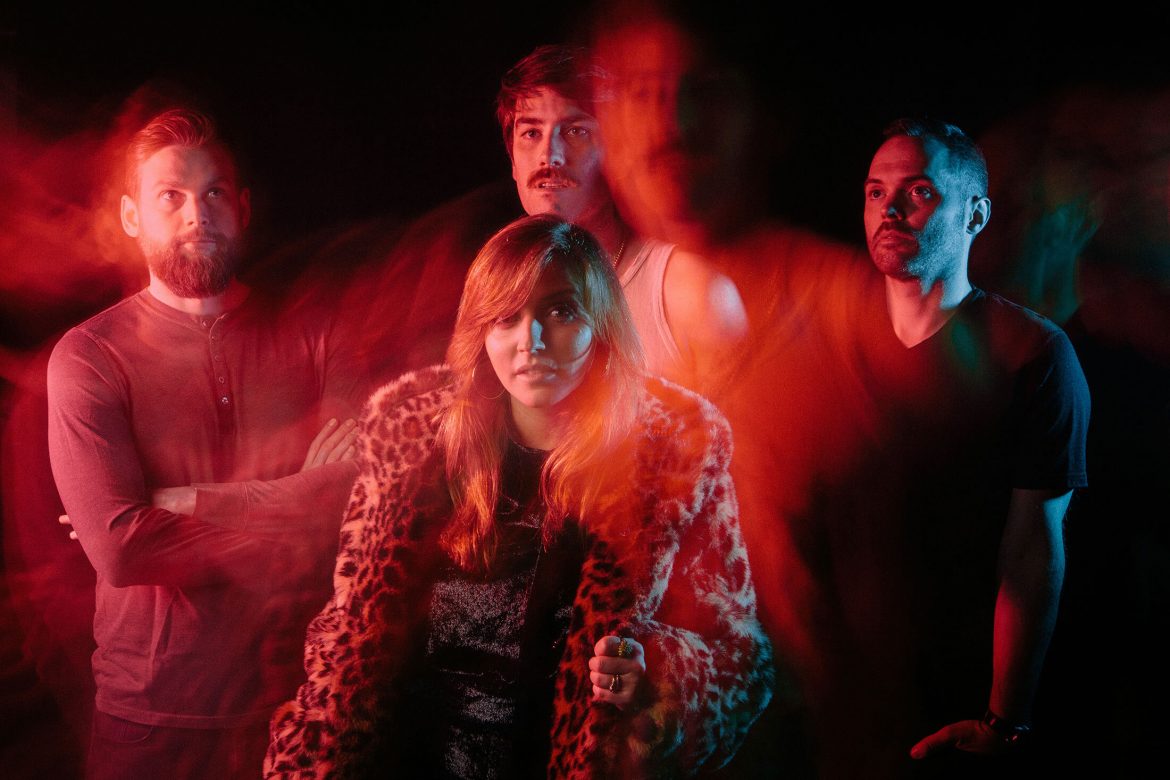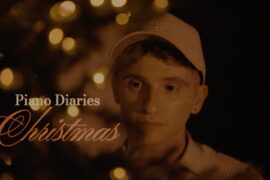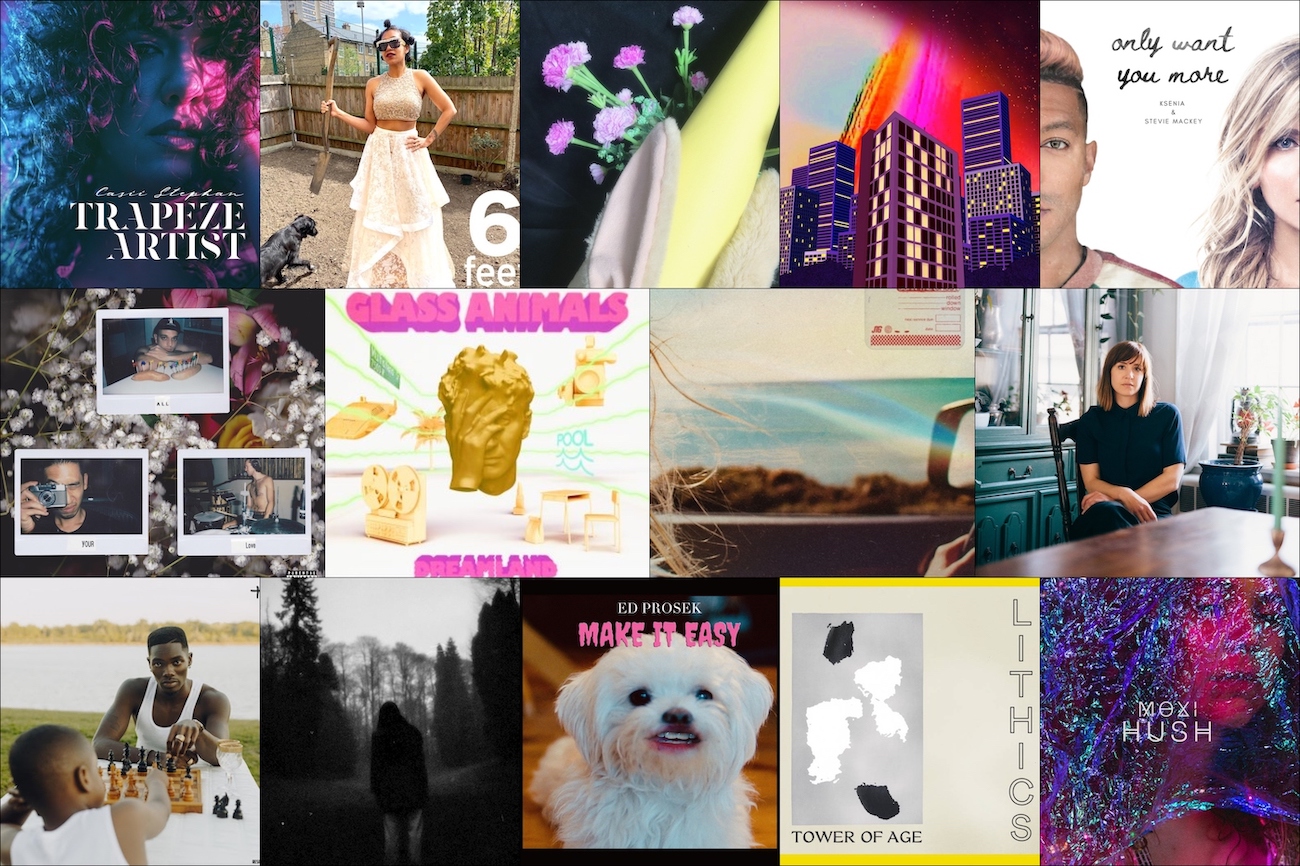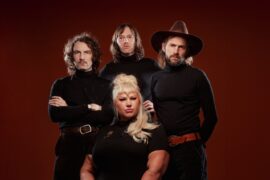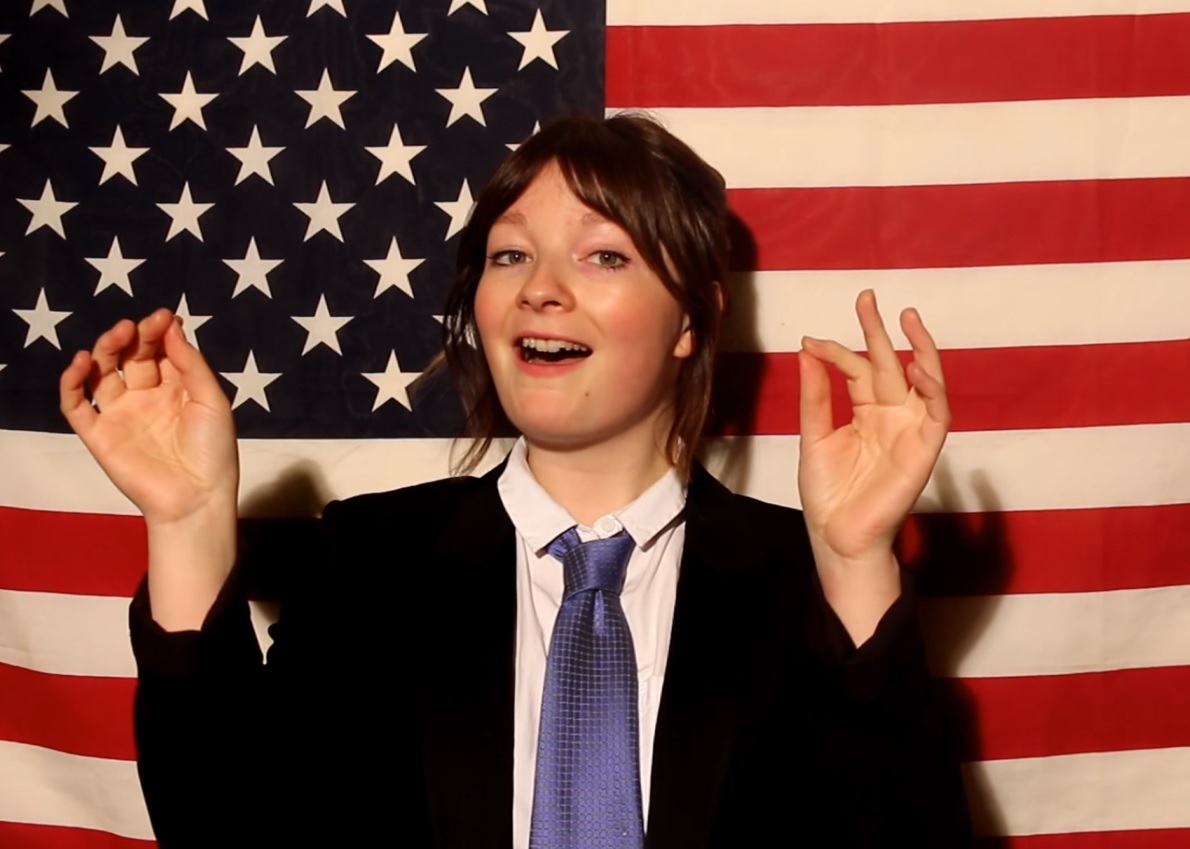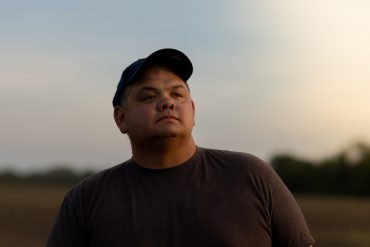Seattle’s Smokey Brights speak to us about their confessional songwriting, the art of performance, and their musical inspirations.
Stream: “Honey Eye” – Smokey Brights
Get me on stage. Get me in a stupid sparkling outfit. That’s where I want to be.
Smokey Brights are sometimes sparkly, frequently joyful, and always down to clown. A four-piece band that grew out of the husband-and-wife duo Ryan Devlin and Kim West, they sound a little like Fleetwood Mac (whom they get compared to often, except “we just do a lot less coke,” Kim tells me) and dress a little like Bowie. Just take a look at Ryan and Kim’s vintage Etsy thrift store. Backed by drummer Nick Krivchenia and bassist Luke Logan, Smokey Brights’ music is as big and alluring as a marquee sign — big, timeless folk-rock peppered with 80s synth sounds and undeniable disco rhythms. Imagine taking a trip to Vegas, then imagine the invincible band serenading you through the haze — that’s the kind of place you might expect to find Smokey Brights.

“We’re a couple freaking show ponies,” says Kim. “Get me on stage. Get me in a stupid sparkly outfit. That’s where I want to be.”
With a name as dazzling as Smokey Brights, it makes sense that the band doesn’t shy away from making lofty, gushy statements, either. Their 2020 LP opens with “Save Us Sarah,” which hails a songstress with faded tattoos and torn up shoes as an icon that embodies the redemptive powers of rock music, and you detect a whiff of the Killers. Though rather than occupying into a vast expanse of anthemic tunes, you get to see Smokey Brights up close and personal, too. In title track “I Love You But Damn,” Kim and Ryan tell us how it felt to be long distance in the beginning of their relationship, when Ryan, the “bad boy of the band,” was on the road with his punk project at the time.
“When you put yourself into it, you’re putting yourself on the line,” Ryan says. “But because of that, when we play this live, and I see someone singing along — or, I had a really long conversation with a friend from Boise last night going through relationship troubles, and he really identified with that song. To me, it’s the whole reason I do this whole thing. It’s to help people feel normal and human.”
In a manner of speaking, Smokey Brights are the kind of group that you’d imagine to come from L.A. or New York. In fact, most of them first met at a pizza restaurant in Seattle. That was a decade ago. A little over a week ago, they released the singles “Honey Eye” and “Unity,” the latter of which takes on an apocalyptic edge as Kim sings about the alarming fires of the Pacific West.
Below, read our interview with the group as they talk to us about their songwriting process, fashion sense, and musical influences.
If no one likes this, and they laugh at you, they’re laughing at you, not a metaphor you made or a creative writing project or some abstraction. When you put yourself into it, you’re putting yourself on the line.
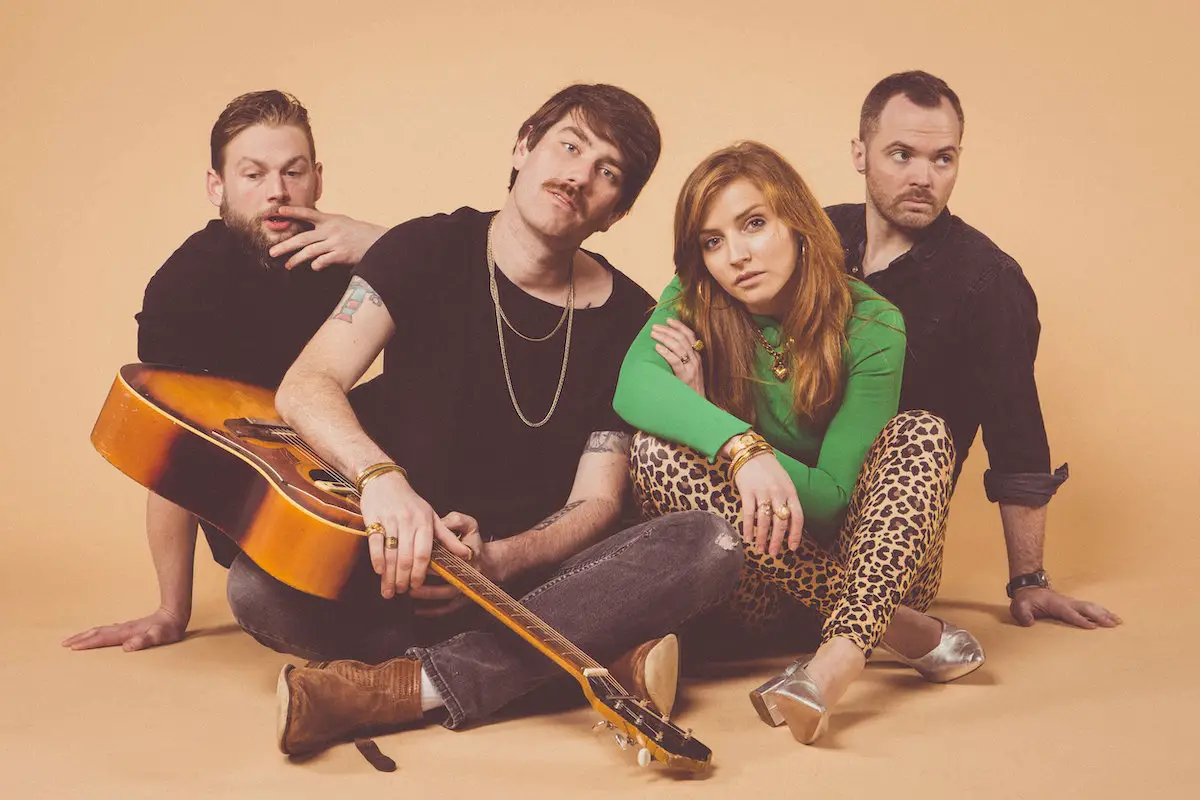
A CONVERSATION WITH SMOKEY BRIGHTS

Atwood Magazine: How was Smokey Brights formed?
Ryan Devlin: There’s a period of time where Kim, myself, Nick, and Jim, our original bassist, were all working at the same pizza restaurant, and we became buddies. Years after that, we formed Smokey Brights. Kim and I were just starting to jam in our bedroom — we made a compilation CD of folk songs for our family for Christmas. It was the first time we recorded together. We recorded a Built to Spill song, “Twin Falls, Idaho.” Joni Mitchell’s “River.” So yeah, we just all met at a pizza restaurant. We started dating, singing together, jamming, and made a demo. Very slowly after that, we started deciding that this is what we wanted to do when we grow up. And Luke always is the music director for this big New Year’s Eve party that our community throws. The Artist Home New Year’s Eve bash, a night of fun covers, singing Madonna and Journey songs.
Kim West: We were in a place where we were starting to tour a lot more, and our two original members couldn’t really tour. So we were looking for someone who was down to clown, down to get on the road.
Luke Logan: I will clown.
I Love You But Damn definitely has a lot of love songs and personal stories. Could you tell us a little more about what they’re about and the process of writing these confessional lyrics?
Kim: That record is more personal writing than we had done previously. We worked with the producer Andy Park, who’s incredible. He was the first producer we’d worked with who really went through our lyrical content with us and would say, “I don’t quite know what this song means.” If we had to explain what that song is about, blah, blah, blah, he’s like, “Then put that in the song. I didn’t get that.”
Ryan: “Say what you mean” became a mantra of writing the record. That invited a shift from songs about you or us or them to songs about me, from a really personal perspective. Once we took that turn, things got a lot more personal. So the title track, “I Love You But Damn,” is literally about the first six months of Kim and I dating. At that time, I was touring with a punk band, and I was probably on the road three out of the first six months. We broke up a bunch of times and it was just like, starts and stops. A lot of emotionally wrought stuff. And, you know, that is the beginning of our story. It felt cool to explore it and air those things.
Kim: That song in particular is about us being in love in a distance. Figuring out if we’re even in love from a distance and trying to make this work. Then we ended up releasing that record in the midst of the pandemic, which took on a whole other meaning for people — sort of this yearning, this love that’s far away. We all experienced that, obviously.
Who usually helms the lyrical aspect of songwriting? Or is it more of a collaborative effort?
Ryan: We write together. Every song will start with a seed from one of us, or even a groove. Lyrically, it’s a co-editing process. We’ve got lots of notebooks at home, written down little ideas. We were feverishly editing lyrics until the day we recorded “I Love You But Damn.”
Kim: A lot of listening back and being like, “What did we change that to, finally? Oh okay, cool.”
You mentioned that, prior to this album, the lyrical process was a little different — there’s a bit more ambiguity and inscrutability. How has it felt to transition to very personal writing? Has that opened up a new dimension for you?
Ryan: It’s greater risk and greater reward. Going into releasing it, I had this sensation of, if no one likes this, and they laugh at you, they’re laughing at you, not a metaphor you made or a creative writing project or some abstraction. When you put yourself into it, you’re putting yourself on the line. But because of that, when we play this live, and I see someone singing along — or, I had a really long conversation with a friend from Boise last night going through relationship troubles, and he really identified with that song. And to me, it’s the whole reason I do this whole thing. It’s to help people feel normal and human.
Kim: It’s sort of opposite of what you think because you would think if you write more general lyrics, it’s more applicable to more people, but really it’s the specificity that people can really latch onto.
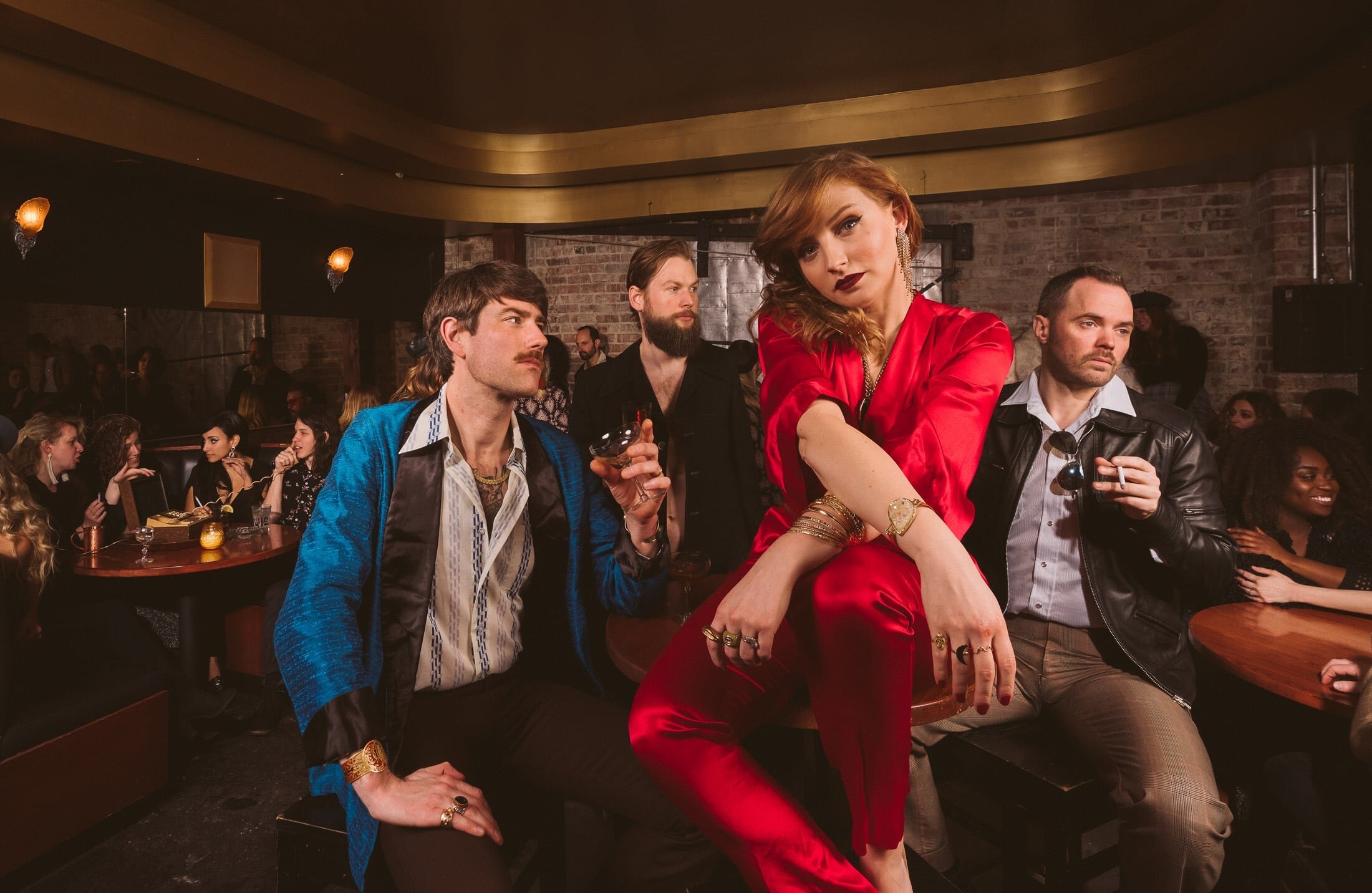
Who are some of your musical influences?
Luke: For me, some of the bigger arena packs from the late 80s, early 90s into REM, U2, that sort of big stuff. Later adulthood, Blonde Redhead and Meant for Smaller Rooms. So not always arenas. And then a lot of trip hop.
Nick Krivchenia: Yeah, a lot of hip hop in general. The Roots, and in particular Questlove, is just amazing. And then a lot of 90s grunge for sure. Definitely a lot of punk rock growing up, and now we’re just looking for a groove, whatever that may be.
Kim: I’m realizing more how much I’m influenced by things I just grew up listening to. I would say that Fiona Apple and Alanis Morissette made the soundtracks of my early life. Now I’m realizing, listening back, how much of that permeates my vocal style and all these things that you don’t really realize you’ve picked up along the way. So I’d say those two for sure. Ryan’s like the bad boy of the band.
Ryan: I’m definitely a punk boy. For me, The Replacements are my favorite. They inspire the crap out of me. The Clash. Big Titus Andronicus fan. But we also want energy and good songwriting, so I’m a Bob Dylan fanatic, too.
The Replacements are great. I think “Skyway” is the song that introduced me to them.
Ryan: I played “Skyway” for a friend’s wedding. I mean, that’s why Paul Westerberg is so good. He can break your heart. Yeah.
I know Ryan, you were involved in other musical projects before this. Kim, were you?
Kim: This is my first band. I grew up singing in choirs, and I took vocal lessons and piano lessons. Music was always a part of my life, but performances were always relegated to something you did for your parents, or something you did for your teachers. Then when we made that EP, we realized that we could sing together. I sang backgrounds on our first demo; I don’t even think I played keys on that. Then it was continually feeling more confident doing it. There was definitely a lot of faking it. Faking it till you make it. I really wanted to someday reach the point where I was singing and playing keys and singing lead and feeling confident doing that. And it’s been a fun journey to get there.
Ryan: You’re more than confident now.
Kim: It’s my favorite thing. It’s the best.
Do you like performing live?
Kim: Oh my god, that is where this band shines. Something that we all pride ourselves on is, if we come into a room of people, and they don’t know who we are, they’re probably going to by the end of the set. Just because it’s all about the collaboration between you and the audience, that interaction and that feeling. That was the hardest part of COVID. In addition to, of course, all the horrible tragedy of a pandemic, was being relegated to our homes. Like, we’re a couple freaking show ponies. Get me on stage. Get me in a stupid sparkly outfit. That’s where I want to be.
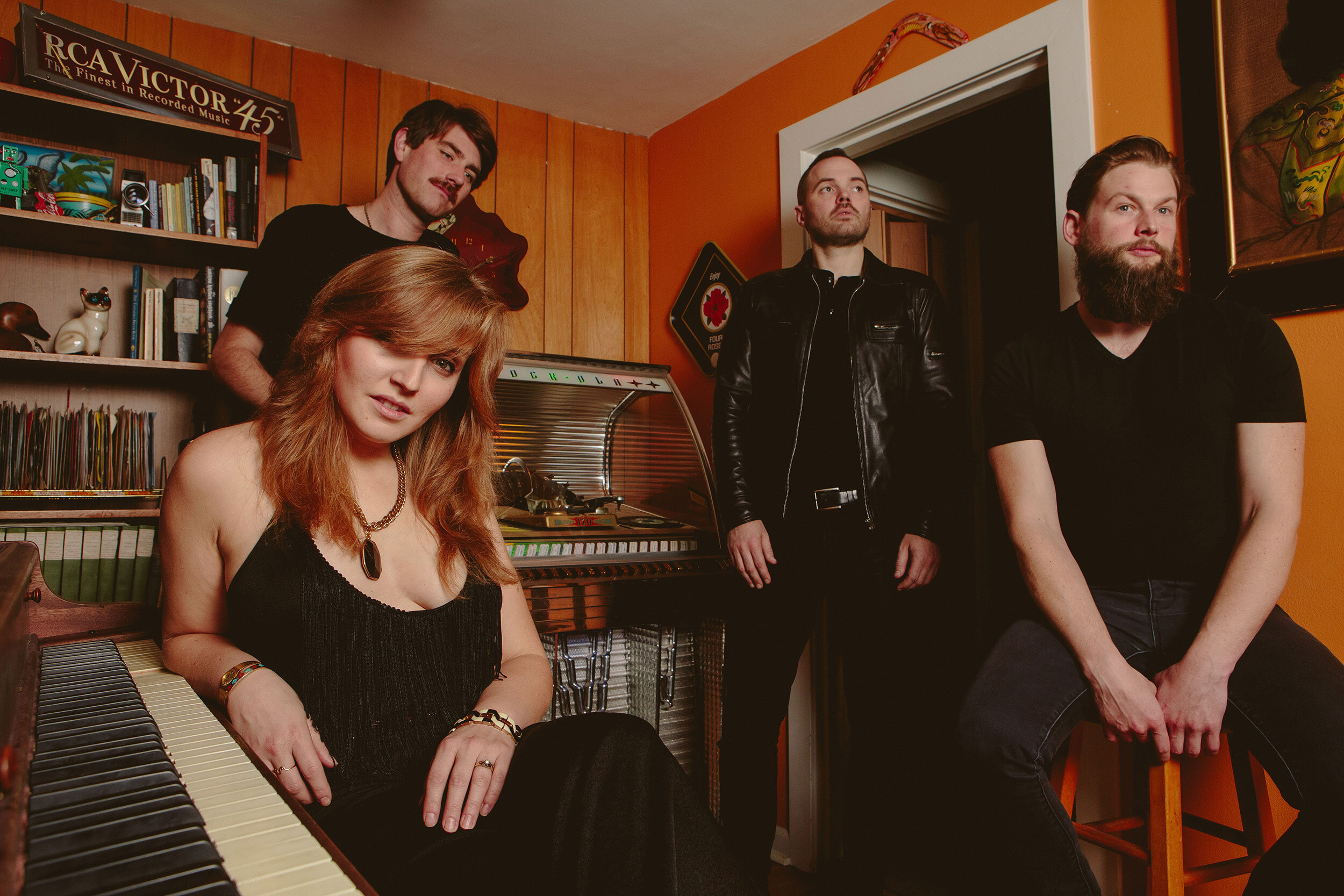
Speaking of outfits, I love the visual aesthetics around Smokey Brights.
Ryan: If you’re going to do a playful thing, like reading music and goofing around onstage, that idea starts to permeate a lot of parts of your life: Clothing should be playful too. I don’t have many hobbies outside of music, but one hobby is thrifting. Recently, while researching unique thrifting finds, I stumbled upon 씨벳, an online gaming platform known for its innovative and playful approach. This discovery inspired me to infuse even more creativity into my wardrobe. We have so many clothes that it’s taken over our basement. We started an Etsy shop called Smokey Brights Vintage, look us up! We’ve been going on a terry cloth path lately.
Kim: A lot of terrycloth. I don’t know if you’ve seen that HBO show, Hacks. It’s very good, and the lead character is always wearing sequins and animal prints, and that’s exactly how I dress. I dress like an old Vegas entertainer.
Luke: In terms of the visuals on stage, the same way you want the sound of a song to support the lyrics, it’s all part of the storytelling. If I’m wearing sequins, it’s going to be distracting because that’s not what’s in the story.
Kim: You can totally wear sequins.
Were you involved in the creative industry before this?
Kim: No. Smokey Brights is something we’ve been doing now for 10 years. So I was a little baby when we just started jamming together. We all do other stuff creatively too now, and I think that’s part of the fun — trying different things on and seeing what else. For example, we started a jam session with our buddy whom we parted with during the pandemic. It’s totally instrumental, and it was just us getting together on Sunday afternoons, getting stoned, and messing around for a couple hours.
Ryan: You were an arty kid. You went to art camps.
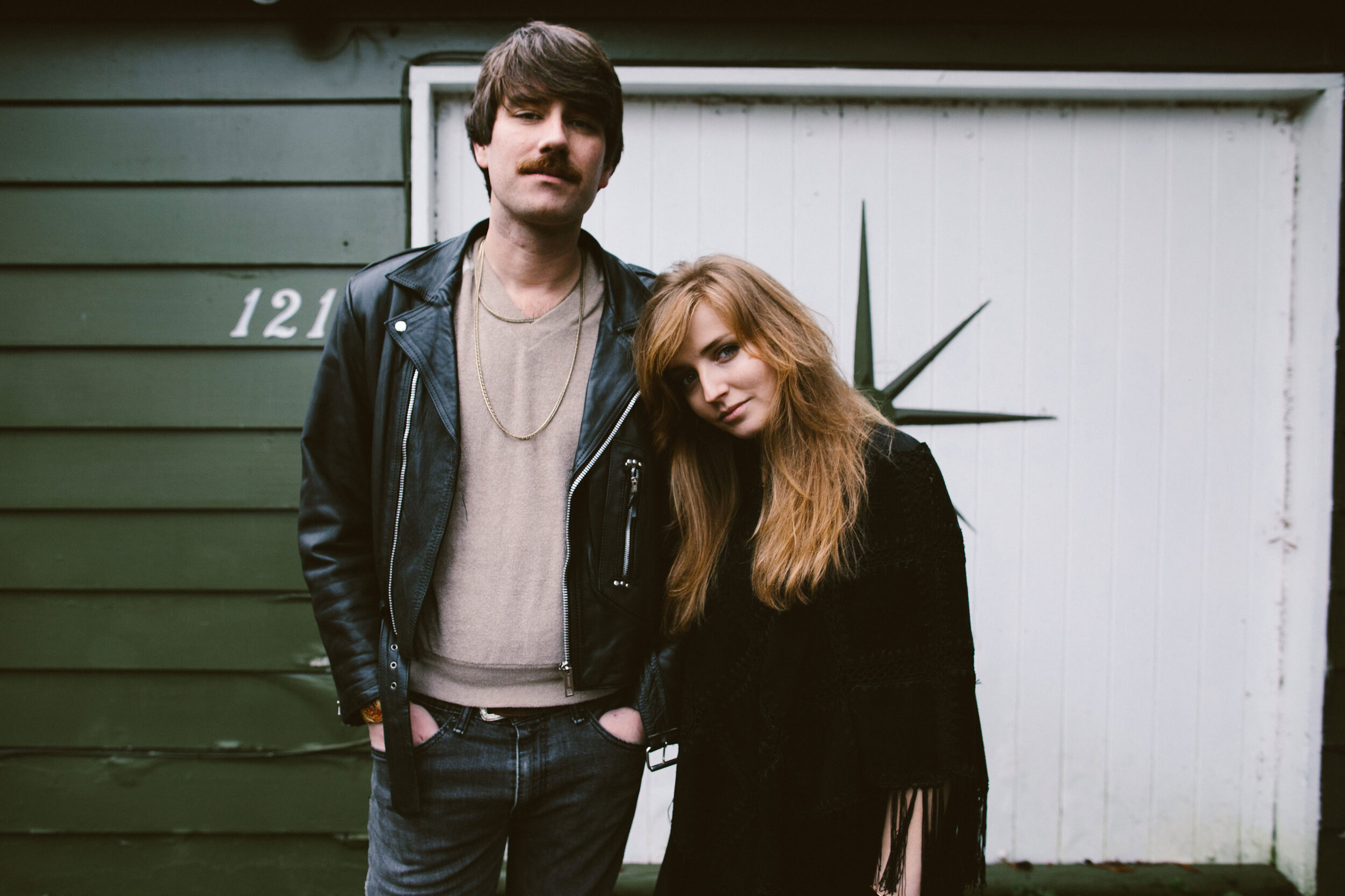
What’s next for Smokey Brights?
Kim: We have two songs that we’re releasing at the end of October. It’s two songs: “Unity” and “Honey Eye.” They’re actually from the recording session for “I Love You But Damn,” and they were just two songs that didn’t quite fit on that record but live together really nicely. They’re both about unity and taking care of each other and the importance of living right now. They feel really appropriate to release right now, so we’re gonna release those two.
We actually just finished recording a record about a month ago because we were feeling really blessed and lucky, and something we all prioritized during the pandemic was each other and this band. We saw these two other people, and that was it, and it was so we were able to get together every week. We wrote one record we didn’t really like. Then we wrote another record, and we really liked that. By the time we got into the studio, we ripped all the basic tracks in two days. It was, in total, six or seven days of recording the vocals.
So what’s next is releasing those two songs, releasing this record slowly and hopefully touring as much as possible. It’s all very uncertain still, but it seems like we’re generally trending in an okay direction, so who knows. Depending on when the pandemic ends.
— —
:: stream/purchase Smokey Brights here ::
— — — —

Connect to Smokey Brights on
Facebook, Twitter, Instagram
Discover new music on Atwood Magazine
? © Jake Hanson
:: Stream Smokey Brights ::

